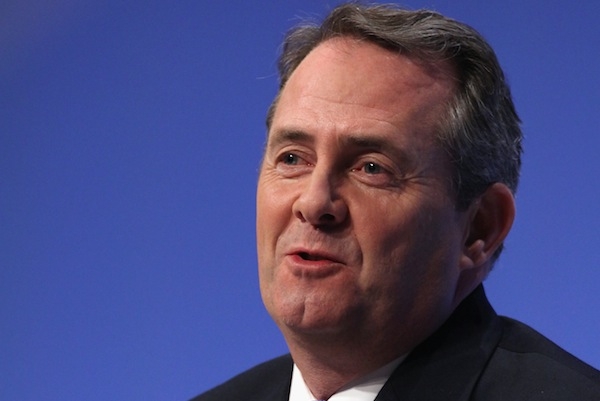Liam Fox sparked a row with a former diplomat today after accusing the Foreign Office of an institutional bias towards greater integration with the European Union.
The former Defence Secretary is building up a reputation for himself as a rallying figure for the eurosceptic right wing of the Conservative party with a series of speeches on Britain’s relationship with Europe, and today he attacked the civil service for having a weak spot for the continent. He told an Open Europe event at the Royal United Services Institute that the government’s desire to renegotiate its EU position was impaired as a result of the FCO being ‘totally wedded to the concept of ever-closer union, for whom integration into the EU is virtually an article of faith’. Fox said:
‘I think it is the conventional wisdom, and has been for some considerable time, in the Foreign office that integration is largely Britain’s foreign policy. I think that we need to move away from a position that presumes we can’t do things unless the EU agrees to them. That is what William Hague has been doing as Foreign Secretary and I’m not sure he always has the total united support of the office. We have the complete expertise within our country to renegotiate, it’s now a question of helping it find its way into the civil service.’
But though that position might be popular with many Tories, Fox’s words offended Sir Paul Lever, the former British ambassador to Germany and Assistant Under Secretary at the Foreign Office, who told Coffee House Dr Fox was deliberately shifting the focus of debate to make political points:
‘Civil servants, whether you like it or not, work for ministers. Those in the Foreign Office worked as enthusiastically for Mrs Thatcher when she was waving her handbag as they did for other Prime Ministers of Foreign Secretaries who had completely different views. For former ministers to rubbish civil servants because they are afraid of criticising their party friends is a cop out.
‘If you don’t like the country’s policy on the EU, criticise the ministers who are making it. The idea that they are all just prisoners of their civil servants and they just do what the department tells them to do is bollocks, that’s not how government works and he knows its not how government works.’
Fox’s talk comes before David Cameron’s long-trailed speech on Europe, and his interventions are clearly designed not just to pressure the Prime Minister into a eurosceptic-friendly foreign policy, but also to position himself as someone who understands the concerns of those in the Conservative party who are worried about its current direction on European policy. Like many of his colleagues, he pointed to the growing threat of UKIP, saying:
‘If we’re approaching a new consensus, at least in the Conservative party and amongst our natural supporters, who incidentally number many more than our recent voters, then we need to be aware of the dangers that the constraints of time place upon us. If Conservatives are to have the credibility on the European issue in the eyes of the electorate, then we must have a settled position that is clear, concise and consistent, and we do not have an infinite length of time in which to set it out. We will be fighting European elections in 2014 and we cannot allow the contents of our 2015 general election manifesto to look like a reaction to that most unpredictable event.
‘We must have a clear position before 2014. I believe that if we have to have a policy in place by the time of the party conference season in 2013. The longer we hold a clear position, the more likely we are to be credible and thus to be able to both take advantage of a growing trend among the British electorate and to see off parties such as UKIP by supplanting them rather than accommodating them.’






Comments